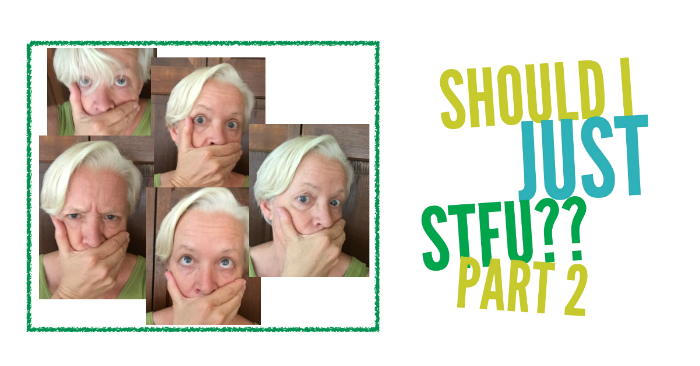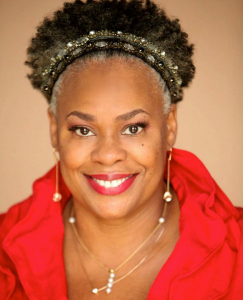 Last week, I wrote about why you can’t claim your habits of speech are “feminine speech,” and critics of your voice should just STFU.
Last week, I wrote about why you can’t claim your habits of speech are “feminine speech,” and critics of your voice should just STFU.
My experience in coaching hundreds of women to shift their old voice stories and their disempowering habits of speech, and watching their whole lives open up afterward (businesses taking off, relationships healed, creativity unblocked, money flowing, confidence soaring) shows me how vital it is that you NOT accept this stupid idea.
If you haven’t read last week’s article, read it HERE, otherwise this won’t make as much sense to you.
So what are disempowering and/or injurious habits of speech? Why are they disempowering rather than just “feminine?”
First, some info about our brains. Hearing is the act of collecting sound. Listening is what the brain does with what it hears, and that involves lots of complex functions in the brain called “auditory processing.” If you want to be truly heard and understood, you have to give people’s brains the opportunity to do all this auditory processing in a way that results in actual listening, not just hearing.
Actual listening results in communication, more often than not. Hearing does not guarantee listening. Speaking to create communication is a skill most of us need to get better at.
Disempowering and potentially injurious habits of speech actually IMPEDE communication. Here’s how:
Your tone of voice doesn’t match your message:
Our brains are highly attuned to pick up nuances of speech, and are trained to pick up all the subtleties of tone of voice, body language and wording. Notice “wording” comes last. Especially when tone of voice or body language don’t match your words, our brains pay more attention to the former two, and the least amount of attention to the words.
This means if you’re using a tone of voice that sends a different message than your words, your tone of voice is ultimately doing the communicating. (This is a frequent cause of miscommunications for both men and women, and you can watch me give a fun demonstration in this video.)
“Vocal fry” is a low, gravelly, growly sound. Even people who don’t use it all the time often fall into it at the end of a sentence. Vocal fry fatigues your voice fast, and can cause nodes on your poor vocal folds – a voice injury you’ll then have to deal with if you want to be able to continue to talk. Use it only sparingly, NOT as your main habit of speech. It also makes you hard to understand, and robs your voice of expression and energy.
Why, exactly, would you want to talk this way? Because it’s cool? Because friends or celebrities do it? Smoking used to be cool, too.
It’s not just women and girls who use vocal fry, by the way. As I wrote earlier, my younger son has gotten the habit, and I very often have to ask him to repeat what he said because I couldn’t understand him. (And no, my hearing’s not going yet!)
Uptalk:
“Uptalk” is the habit of making your pitch rise at the end of statements, as if they were questions. This makes your listeners always have to try to figure out if you are asking a question or making a statement. While they’re doing that, they’re not paying attention to WHAT you’re saying. It actually DOES make you sound like you’re not confident or sure about what you are saying. (And yes, young men do this, too. It’s also disempowering for them.) People think you are placating them or asking for reassurance – “Is it all right that I’m saying this?” and they get exhausted and irritated trying to keep reassuring you.
Breathiness:
A breathy tone can’t get very loud, so you are likely to be hard to hear. People may talk over you. You can’t project well, so you will fatigue your voice when you’re trying to lead a meeting or teach a group without a microphone. It can make you sound hesitant and unsure of yourself. It can also be a way of avoiding attention and camouflaging yourself.
Run-On Sentences:
When you continually talk really fast and use run-on sentences, people’s brains start to hurt. They can’t keep up. They’re going to miss a lot of what you’re trying to say, therefore, they’re not going to get your point. Our brains need pauses, lots of expression, and clear declarations to understand what you’re saying.
One of my clients discovered she used this technique because she was afraid of being interrupted and silenced. The habit came out of the way her mother treated her during childhood. There are better ways to own your authority and avoid interruptions! That’s one of the things I teach my clients.
Soft-spoken:
It makes you hard to hear and understand, and you can sound unsure and lacking in confidence. Most soft-spoken people are also reluctant to jump in and speak up in meetings and conversations. They tend to wait to let others speak first, and sometimes never get their chance. Also, they may offer an idea and find that no one pays any attention to it. Then, when someone else speaks the same idea later, everyone says, “Oh, that’s a great idea!” Being soft-spoken can make you sound less credible. You also have to repeat yourself a lot because people couldn’t hear you the first time.
It’s another way of hiding out, too, like breathiness.
This is generally more a habit for women than men, but I’ve worked with men who have this issue, too, because of how they were raised. It can be cultural – many Asian cultures are more soft-spoken than we are in the United States, and women are expected to be even more soft than the men.
So, my loves, DO NOT claim your disempowering speech as “feminine.” You know you are empowered to be leaders, to hold public office, to change the world. That disempowering speech is another way of disempowering yourSELF, and will hold you back from all you truly want to do and achieve.
One of the authors I read recently on this topic thinks it is precisely BECAUSE young women are now so empowered that our culture is assigning them “a socially appropriate mannerism” that holds them back. Hmmmmm…..
Don’t buy into the mannerisms. You have SO many more options for expression. Use all of them. Know how to use your strong, powerful, passionate voice when it’s needed. Don’t get stuck in vocalisms that trivialize your message and undermine the effect you can have.
Use uptalk and vocal fry with your friends if you want. Don’t use them with professors, colleagues, bosses, on the media, with clients and customers, on stage. Don’t use them when you have an important point to make.
Use breathiness in certain circumstances just to change up your delivery, or to illustrate a point in a certain way. Develop your strong voice so you can use it to be taken seriously, to get your ideas noticed, to make a point, to speak up for yourself, and to be understood.
Be soft-spoken at home with your family if that is comfortable. Be willing to speak up, get attention and be noticed at school, at work, in the lab, with clients and customers. Learn to use your voice so you can actually be heard in noisy restaurants and so people will stop talking over you. Learn to speak up in meetings and classes. Learn to project your voice in a healthy way so you don’t fatigue it when you need to teach, lead, lecture, speak on stage. I’ll be happy to teach you how.
“Just don’t” use run-on sentences. Make your points confidently and clearly in your strong voice. Slow down and take deep breaths. It helps YOU organize your thoughts more easily, make your points clearly, and it helps your listener’s poor brains catch up and actually understand you.
I’m not asking you to put on any kind of fake voice. I’m asking you to be willing to speak up and speak out from ALL of you in all kinds of ways – to speak from all of strong, beautiful, powerful you with a message to deliver that the world needs to hear.
That’s powerful feminine speech.
These are all things I help my clients with. It’s a lot of fun, and it’s deep work. If you’d like to talk about how I could help you, CLICK HERE and schedule a free consultation.
===========================================================
 A client rave: “Now I can choose how to speak. I have options! You dispelled my idea that there was A REGISTER, and RANGE I needed to be in my voice. I learned that all of it is mine. All of those nuances are part of me – my variety, my spice, my uniqueness. I can bring all of it. I have access to all of my voice. You brought a lot of stuff out of me that I normally wouldn’t talk about, and I saw how those old stories were holding me back. The more real I am, the more love I get. My power is diluted when using my learned, ‘corporate and controlled voice.’ “ – Stone Love
A client rave: “Now I can choose how to speak. I have options! You dispelled my idea that there was A REGISTER, and RANGE I needed to be in my voice. I learned that all of it is mine. All of those nuances are part of me – my variety, my spice, my uniqueness. I can bring all of it. I have access to all of my voice. You brought a lot of stuff out of me that I normally wouldn’t talk about, and I saw how those old stories were holding me back. The more real I am, the more love I get. My power is diluted when using my learned, ‘corporate and controlled voice.’ “ – Stone Love
I’d love to support YOU in getting all the juicy benefits of speaking in your authentic voice. Let’s talk!
================================================================
Client Rave: “Ariana, thank you for being my guiding light, my beam of hope for speaking with power, authority and confidence, and for helping me unblock my greatness. You are SO multi-talented, and I’d recommend you to everyone!” – Josephine Hanan
If you ‘d like to talk with me about the possibilities of working together, book a Voice Your Value Breakthrough Session! My treat. We’ll explore how to empower your authentic voice, reclaim parts of yourself that have been shushed and silenced, craft your compelling story, and brainstorm opportunities for business and personal growth, so you can step into YOUR greatness.